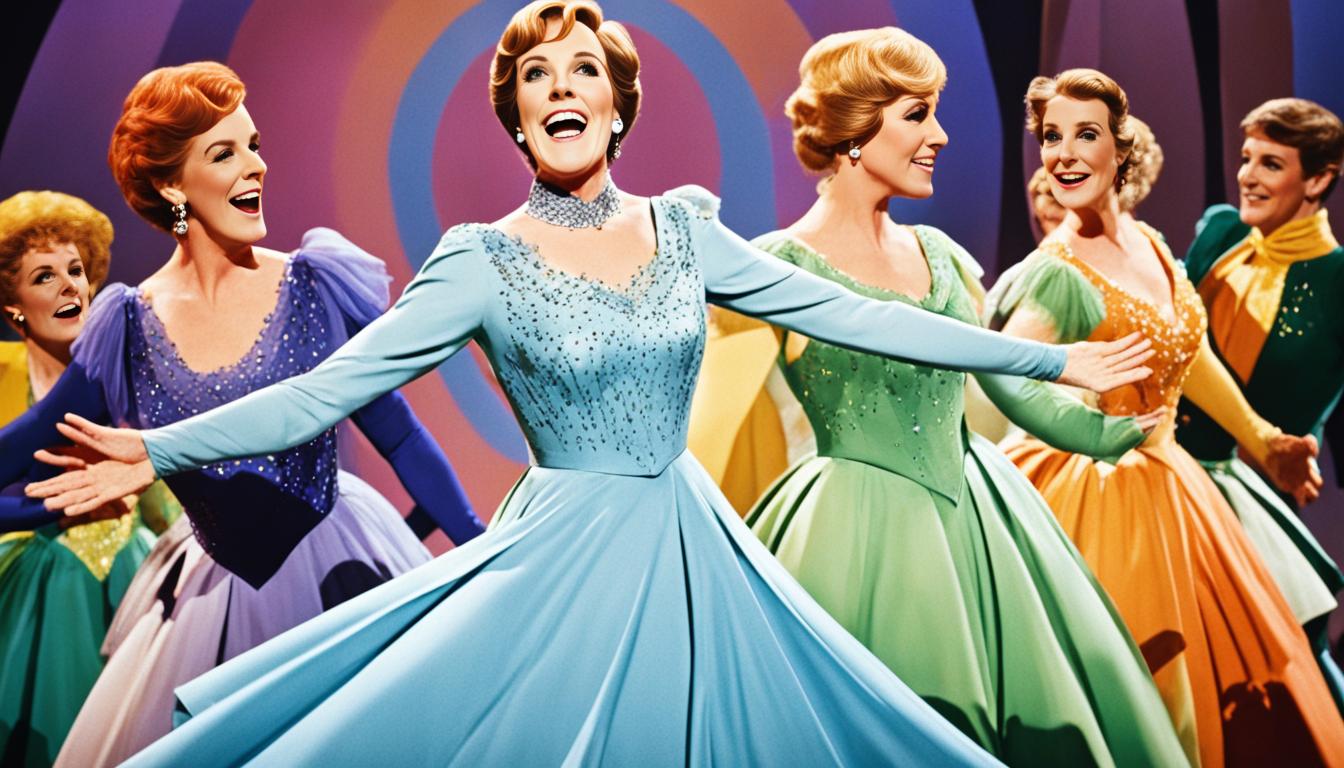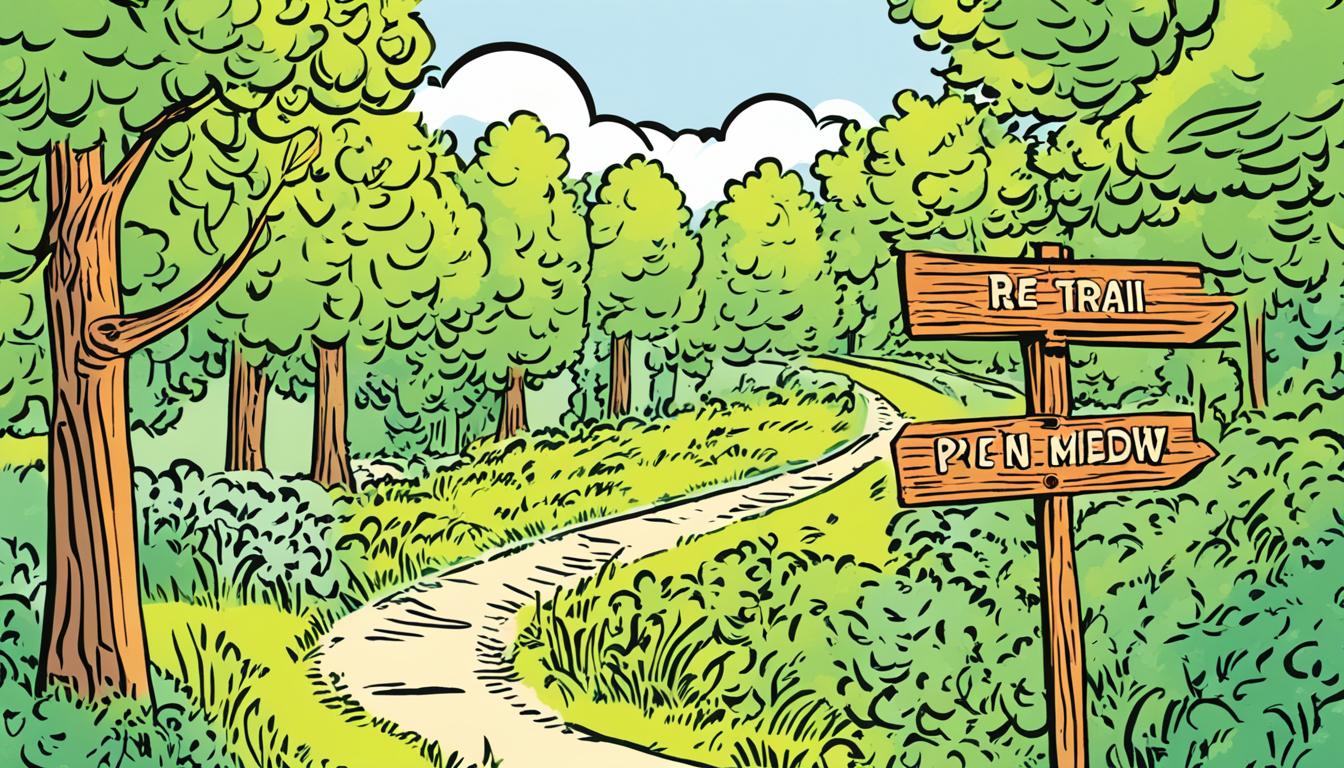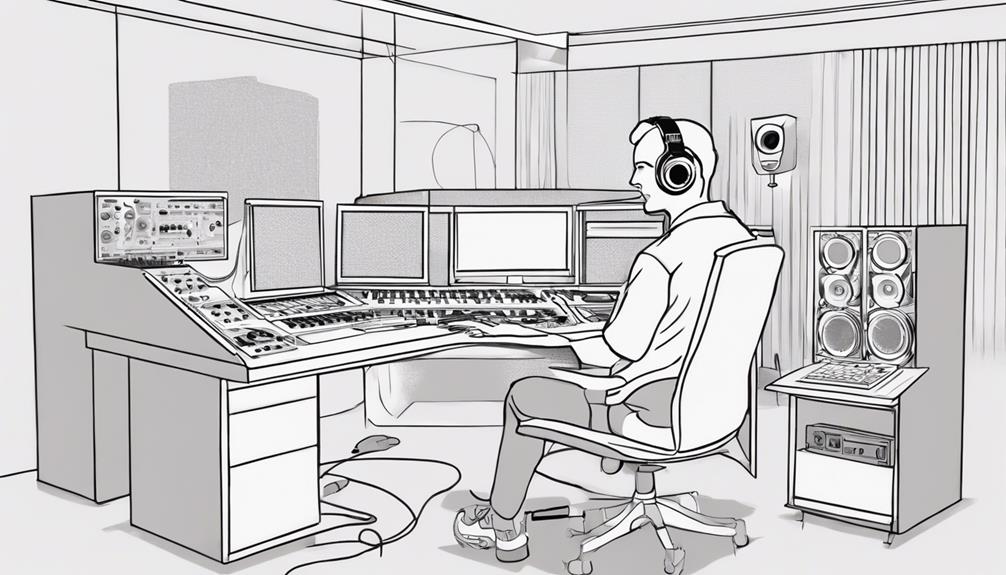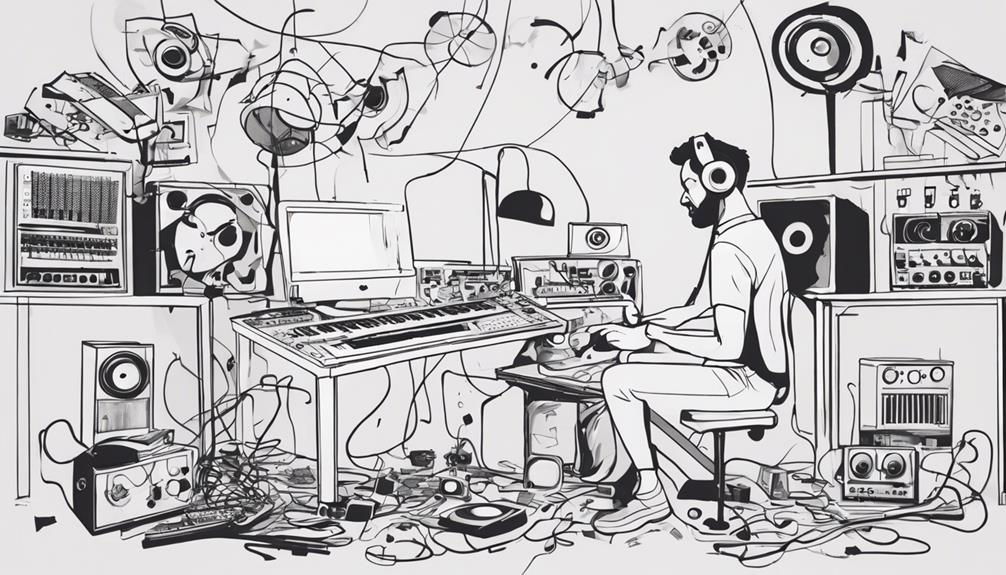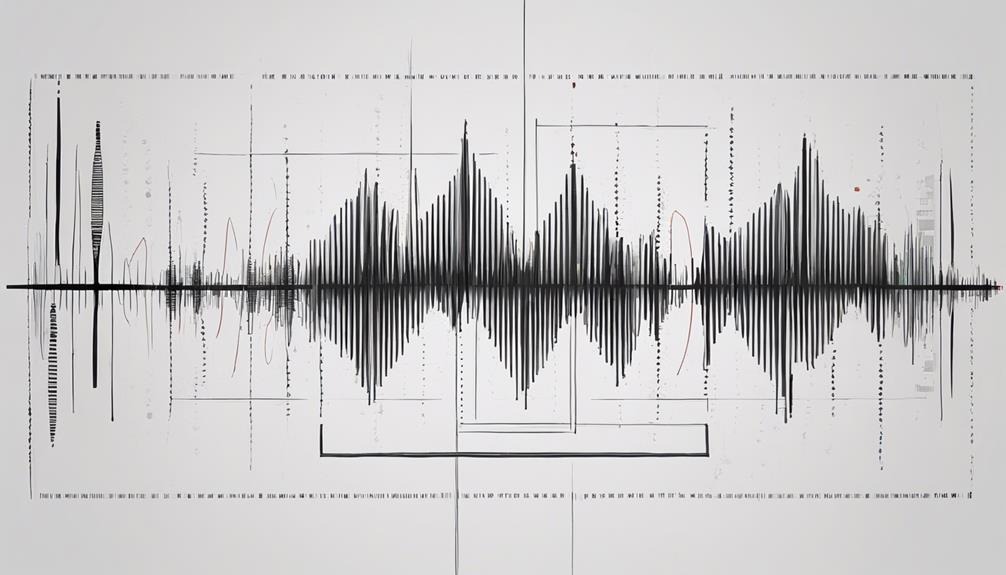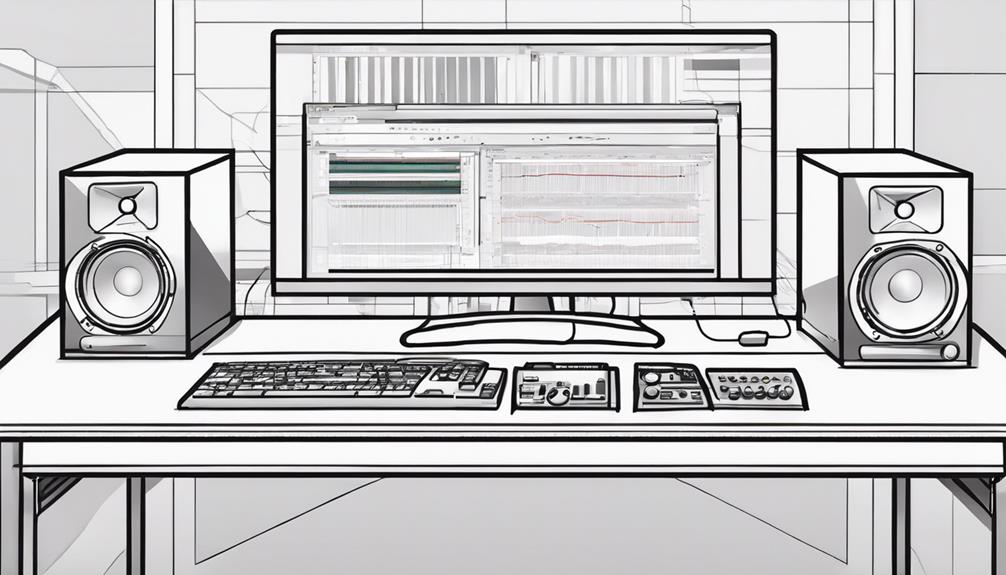Did you know Julie Andrews was born as Julia Elizabeth Wells on October 1, 1935, in Walton-on-Thames, Surrey, England1? She’s been shining in the entertainment world since 1945. Andrews has soared to become a legend in acting and singing over eight decades1.
Her exceptional gifts have won her many awards. These include an Academy Award, a BAFTA Award, two Emmy Awards, three Grammy Awards, and six Golden Globe Awards1.
Julie Andrews is not just a star on screen and stage. She’s also a gifted writer. She tells her story in two autobiographies: “Home: A Memoir of My Early Years” (2008) and “Home Work: A Memoir of My Hollywood Years” (2019)1. Through these books, readers get a close look at her life and the hurdles she overcame.
Key Takeaways:
- Julie Andrews, born Julia Elizabeth Wells, has been active in the entertainment industry since 1945.
- She has won numerous awards, including an Academy Award, a BAFTA Award, two Emmy Awards, three Grammy Awards, and six Golden Globe Awards.
- In addition to her successful acting and singing career, Julie Andrews is also an accomplished author.
- Her autobiographies, “Home: A Memoir of My Early Years” and “Home Work: A Memoir of My Hollywood Years”, provide insight into her life and experiences.
- Julie Andrews’ talent and versatility have made her an iconic figure in the industry.
Early Life and Stage Career
Julie Andrews was born as Julia Elizabeth Wells on October 1, 1935, in Walton-on-Thames, England. She grew up in a world filled with music, thanks to her family’s influence. From a very young age, Andrews showcased her talent on stage, winning people over with her beautiful voice2.
By 12, she made her first radio appearance in 1946. She sang alongside her stepfather, Ted Andrews, on a BBC show3.
At 18, Broadway called her to the United States with a one-year contract. Andrews hopped on a plane, excited for her new journey. She first appeared on Broadway in “The Boy Friend,” starting a remarkable stage career3.
Her role in “My Fair Lady” in 1956 brought her fame and love. Many considered it the best musical ever, with tickets gone in no time3.
Andrews touched many with her music throughout her career. Her work in “My Fair Lady” became a hit, making record sales at Columbia Records. It stayed popular for years3.
While shining on stage, she caught Disney’s attention during “Camelot.” Offered the role of Mary Poppins, she joined after her daughter’s birth. This role showcased her diverse skills3.
Her role in “Mary Poppins” earned her great acclaim in 1965. Andrews won both the Academy Award and Golden Globe for Best Actress. These wins cemented her Hollywood fame3.
Andrews was also celebrated for her musical talent. In 1965, she received a Grammy Award for Best Album for Children. This honored her broad appeal and versatility3.
Julie Andrews has always been a standout talent. Her journey from the stages of England to global fame is truly inspiring. With her angelic voice and presence, she’s left a lasting mark on entertainment.
Film Success with Mary Poppins and The Sound of Music
Julie Andrews became famous for her roles in Mary Poppins (1964) and The Sound of Music (1965). In Mary Poppins, she played a magical nanny and won over viewers. She got an Oscar for Best Actress and fans everywhere still love the movie4.
The Sound of Music came right after, making Andrews even more popular. This movie is seen as a huge success from that time4. Andrews showed her skills as an actress and singer as Maria von Trapp. Even though not all critics liked it at first, it quickly became very popular5. The film’s blend of music, heartfelt storytelling, and stunning visuals captured audiences worldwide, solidifying its place as a classic. Tied closely to the von Trapp family history, the movie brought a dramatized version of their escape from Austria to the big screen, introducing their story to millions. Its enduring legacy continues to influence musicals and inspire audiences decades later.
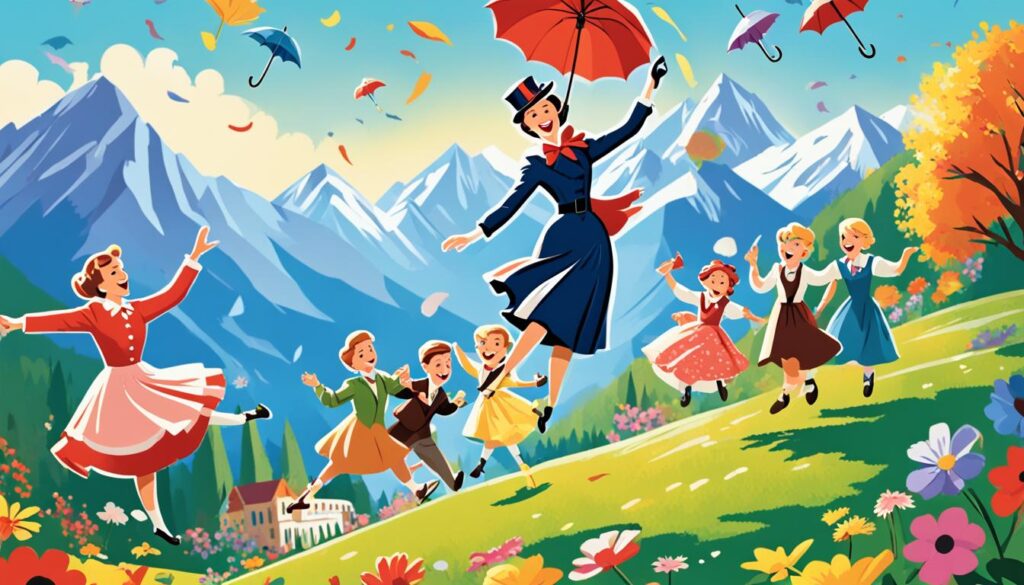
In The Sound of Music, there’s a famous scene where Andrews spins on a hill. Yet, filming it was hard because a helicopter kept knocking her down4. She still managed to shine, despite these problems. This film is now among the top money-makers ever, when you adjust for inflation6.
Film Projects with Husband Blake Edwards
Julie Andrews and her husband Blake Edwards were a powerful team, both in life and work. They combined their talents on many movies, creating magic together7. They gave us films like:
- Victor/Victoria (1982): In this beloved musical comedy, Andrews shines as Victoria, a singer posing as a male impersonator. Directed by Edwards, it was a hit and got Andrews an Oscar nod for Best Actress.
- S.O.B. (1981): Andrews steps out of her comfort zone in this satire, supporting her husband’s vision. Directed by Edwards, it takes a sharp look at Hollywood’s underside. Andrews’ role caught both critics and fans by surprise.
- 10 (1979): Edwards’ romantic comedy-drama 10 focuses on a man enchanted by a younger woman, Bo Derek. Andrews plays a key role, bringing her unique charm to the movie.
Despite many successes, not all their projects were hits. Darling Lili (1970), a musical spy film by Edwards, didn’t win over audiences7.
Julie Andrews and Blake Edwards were married for 41 incredible years until his death in 2010. They took a break in the late ’70s, moving to Switzerland. This move allowed them to enjoy their lives far from Hollywood’s busy scene7.
Five years after losing Blake Edwards, Julie Andrews still felt his absence deeply. Their love and creative partnership were truly special7.
Loss of Singing Voice and Beyond
Julie Andrews, a famed singer and actress, encountered a severe setback in 1997. Her vocal cords got damaged during failed throat surgery. This led to the sad loss of her singing voice8.
Yet, Andrews didn’t let this stop her. She moved her focus to acting, appearing on both big and small screens. She embraced various roles, showing off her acting skills9.

Andrews also entered the world of voice acting. She voiced characters in hits like the Shrek series and Despicable Me8. Her singing voice was gone, but her unique sound lived on in these roles.
She didn’t stop there, venturing into writing too. Andrews wrote over 30 children’s books with Emma Walton Hamilton, her daughter8. They created “The First Notes: The Story of Do, Re, Mi.” It’s about Brother Guido’s musical contributions in the 11th century8.
Julie Andrews has shown incredible resilience through her troubles. She continues to inspire with her dedication to her work. Her story highlights the importance of adapting and staying strong, no matter what10.
Honors and Recognition
Julie Andrews has received many honors throughout her career. She is celebrated for her talent and contributions to entertainment. Her achievements have made her beloved by people all over the world.
Her roles in films have won her prestigious awards. Playing the nanny in Mary Poppins won her an Academy Award, a career highlight11. Her role as Maria in The Sound of Music brought further fame. This film was the biggest hit of its time11.
The American Film Institute praised Julie Andrews for her film and music work. She had two movies in AFI’s top 10 greatest musicals12. Her talent and charm led to her being honored in AFI’s 100 Years series12.
Her talents also shine in music and TV. She won several Grammy Awards, showcasing her singing talent13. Her show, The Julie Andrews Hour, was acclaimed and won many Emmy Awards11.
In 2000, Queen Elizabeth II made her Dame Commander of the Order of the British Empire (DBE). This honor acknowledges her impressive career and impact on entertainment11.

Julie Andrews has made a lasting impact on the entertainment industry. Her talent is celebrated worldwide. She has received many awards, including the Kennedy Center Honors and the Screen Actors Guild Lifetime Achievement Award. These accolades confirm her status as an icon13. Her work has earned respect from peers and fans.
Julie Andrews is a true icon across many forms of entertainment. Her broad career spans Broadway, films, TV shows, and children’s books11. Her talent, memorable performances, and charity work create a legacy that will inspire future generations.
Personal Life and Family
Julie Andrews has led an exciting life, marked by two marriages and a loving family.
She first married Tony Walton in 195914. Their daughter, Emma Walton Hamilton, was born in 196214. Emma is now 59 and has a career similar to her mom’s. She writes children’s books, directs in theater, and acts14.
In 1969, Julie married director Blake Edwards14. Blake was famous for classics like Breakfast at Tiffany’s and The Pink Panther. Julie became a stepmom and also adopted two girls, Joanna and Amelia, with Blake14. They stayed married until Blake passed away in 201014.
Julie Andrews has shared the ups and downs of her life in her autobiographies14. Through all the hard times, her love for her family shone bright. She’s kept a strong connection with her kids and grandkids.
Julie is a mom to five children from both of her marriages15. She also has nine grandchildren and three great-grandchildren15. Her family is very important to her. She treasures every moment with them.
Julie’s personal story is one of strength, love, and commitment to family. Her life’s trials have helped shape who she is. They’ve also supported her success professionally and personally.

| Marriage | Spouse | Children |
|---|---|---|
| First | Tony Walton14 | Emma Walton Hamilton |
| Second | Blake Edwards14 | Two step-children, Joanna and Amelia; Two adopted daughters |
Collaborations and Other Ventures
Julie Andrews is known for her numerous collaborations and ventures in the entertainment industry. She has partnered with various artists, showing off her skills and talent.
Collaborations with Carol Burnett
Julie Andrews teamed up with comedian Carol Burnett in some memorable TV specials. Their comedic teamwork delighted audiences and showcased their talents16.
Julie Andrews also hosted her own variety specials, exploring different entertainment genres. By singing, dancing, and performing comedy, she proved to be a versatile entertainer17.
Julie’s Greenroom and Bridgerton
Recently, Andrews created and hosted “Julie’s Greenroom” on Netflix. This child-friendly show teaches kids about the arts16.
Also, she voiced Lady Whistledown in “Bridgerton” on Netflix. Her unique voice adds a special touch to the series, making it a hit17.
Julie Andrews impresses audiences with her talents through collaborations and solo ventures. Whether in comedic roles or as a host, she connects with her audience, making a memorable impact1617.

Julie Andrews’ Return to the Concert Stage
Julie Andrews made a comeback to live performances with a one-woman show. Backed by a 39-piece orchestra, she showed her singing prowess17.
Her show’s tour stops from Valley Forge, Pa., to Chicago let fans see her live. Andrews’ iconic talent and stage presence shine through17.
A Life of Collaborations and Ventures
Julie Andrews’ career took off in English music halls and Broadway. She reached audiences around the globe with her diverse performances17.
Andrews also focuses on her family, raising two adopted children. She balances work and family life, living in California and Switzerland17.
Returning to the concert stage was a personal decision. It underscores her dedication to her craft and her desire to delight her audience17.
Legacy and Impact
Julie Andrews’ talent and performances have left a lasting mark. Her work as an actress and singer shaped film and theater. Her roles have inspired many.
Andrews won hearts as Mary Poppins and Maria von Trapp. Films like “Mary Poppins” and “The Sound of Music” made her a legend. Her acting and singing have charmed people all over the world.
“My Fair Lady,” featuring Andrews, was a big hit. It stayed in the top 10 of the Billboard 200 for 173 weeks18. “The Sound of Music” soundtrack, also with Andrews, stayed in the top 10 for 109 weeks.
Andrews also made waves in music. Her album “Julie and Carol at Carnegie Hall” was a big success. The song “Super-cali-fragil-istic-expi-ali-docious” from “Mary Poppins” hit No. 66 on the Billboard Hot 100 in 196518.
Film & Music Awards Recognition
In 2011, the Recording Academy gave Andrews a lifetime achievement award18. This recognized her amazing career.
Andrews has won two Grammy Awards, two Primetime Emmys, and an Academy Award. She’s been nominated for three Tony Awards but hasn’t won. Yet, she has received many other awards, including a Primetime Emmy in 200518. She also got a Kennedy Center Honor in 2001, a Screen Actors Guild Life Achievement Award in 2006, and the American Film Institute’s Lifetime Achievement Award in 202218.
Television Accomplishments
Andrews has also made a mark on TV. She’s earned a Primetime Emmy and 11 nominations across 65 years. She hosted “Broadway: The American Musical,” winning acclaim18.
Legacy and Recognition
Julie Andrews is an entertainment icon. Her star on the Hollywood Walk of Fame shows her influence19. She’s celebrated for her captivating performances. Her legacy inspires new artists.
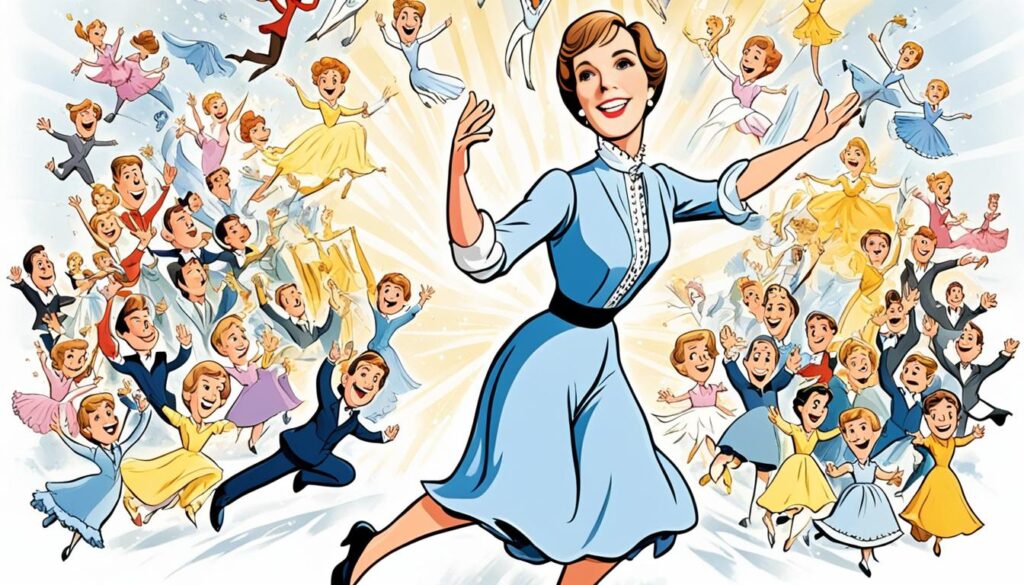
Conclusion
Julie Andrews has made a huge mark as a top actress and singer. Born in 1935 in England20, her talent, charm, and versatility have wowed people everywhere.
Her journey took her from Broadway to legendary films like Mary Poppins and The Sound of Music20. She earned an Oscar for Best Actress for Mary Poppins2021. Her role in The Sound of Music also saved Twentieth Century Fox from closing22.
Even when she faced problems with her voice, Andrews didn’t stop. She wrote a bestselling book and teamed up with her daughter to write more21. She also worked as a Goodwill Ambassador and got awarded a Dame Commander of the Order of the British Empire by Queen Elizabeth II2021.
Julie Andrews’ amazing work in entertainment has made her a cherished and influential star. Her talent and kindness will motivate people for years to come202221.
FAQ
When and where was Julie Andrews born?
What are some of Julie Andrews’ most iconic roles in films and on Broadway?
Has Julie Andrews received any awards for her performances?
Did Julie Enter the World Edwards work on any film projects with her husband Blake Edwards?
What happened to Julie Andrews’ singing voice?
Apart from acting, what other ventures has Julie Andrews pursued?
Has Julie Andrews been honored for her contributions to the entertainment industry?
Can you tell me about Julie Andrews’ personal life and family?
Who are some artists and performers Julie Andrews has collaborated with?
What is Julie Andrews’ legacy and impact on the entertainment industry?
Source Links
- https://en.wikipedia.org/wiki/Julie_Andrews – Julie Andrews
- https://www.pbs.org/wnet/broadway/stars/julie-andrews/ – Julie Andrews | The Stars | Broadway: The American Musical | PBS
- https://achievement.org/achiever/julie-andrews/ – Dame Julie Andrews | Academy of Achievement
- https://www.vanityfair.com/hollywood/2022/06/julie-andrews – Julie Andrews Spills the Tea on ‘Mary Poppins,’ ‘The Sound of Music,’ and ‘The Princess Diaries’
- https://en.wikipedia.org/wiki/The_Sound_of_Music_(film) – The Sound of Music (film)
- https://variety.com/2020/film/news/julie-andrews-mary-poppins-sound-of-music-best-movies-1234785764/ – How Julie Andrews Lost a Part But Won an Oscar for ‘Mary Poppins’
- https://www.countryliving.com/life/entertainment/a45254/julie-andrews-and-blake-edwards-love-story/ – Julie Andrews Is Still Coping with the Death of Her Husband of 41 Years
- https://www.wbur.org/hereandnow/2022/11/01/julie-andrews-kids-book – Music legend Julie Andrews and daughter Emma Walton Hamilton note history of ‘Do Re Mi’ in new book
- http://www.julieandrewsonline.com/news/nov_dec_2006/nov06.html – Julie Andrews Biography
- https://www.deseret.com/2018/12/19/20661516/what-made-julie-andrews-a-great-singer-utah-s-vocal-coaches-helped-explain/ – What made Julie Andrews a great singer? Utah’s vocal coaches helped explain
- https://www.readingrockets.org/people-and-organizations/julie-andrews – Julie Andrews
- http://www.julieandrewsonline.com/news/sept_oct2006/05sept06_2.html – Julie Andrews Biography
- https://en.wikipedia.org/wiki/List_of_awards_and_nominations_received_by_Julie_Andrews – List of awards and nominations received by Julie Andrews
- https://www.classicfm.com/discover-music/julie-andrews-age-films-family/ – All you need to know about Julie Andrews’ movies, children and career
- https://www.smoothradio.com/news/entertainment/julie-andrews-age-children-husband-career-facts/ – Dame Julie Andrews facts: Sound of Music actor’s age, children, husbands and career revealed
- https://kids.kiddle.co/Julie_Andrews – Julie Andrews Facts for Kids
- https://www.nytimes.com/1987/11/17/arts/for-julie-andrews-the-sound-of-a-different-music.html – FOR JULIE ANDREWS, THE SOUND OF A DIFFERENT MUSIC (Published 1987)
- https://www.billboard.com/lists/julie-andrews-recording-legacy/ – Julie Andrews’ ‘Loverly’ & Totally Unique Recording Legacy
- https://kidskonnect.com/people/julie-andrews/ – Julie Andrews Early Life, Career and Awards, Facts & Worksheets
- https://www.encyclopedia.com/people/literature-and-arts/music-popular-and-jazz-biographies/julie-andrews – Julie Andrews | Encyclopedia.com
- https://www.labiennale.org/en/news/julie-andrews-golden-lion-lifetime-achievement – Biennale Cinema 2019 | Julie Andrews Golden Lion for Lifetime Achievement
- https://www.everand.com/book/182544696/Julie-Andrews-An-Intimate-Biography – Julie Andrews by Richard Stirling (Ebook) – Read free for 30 days

